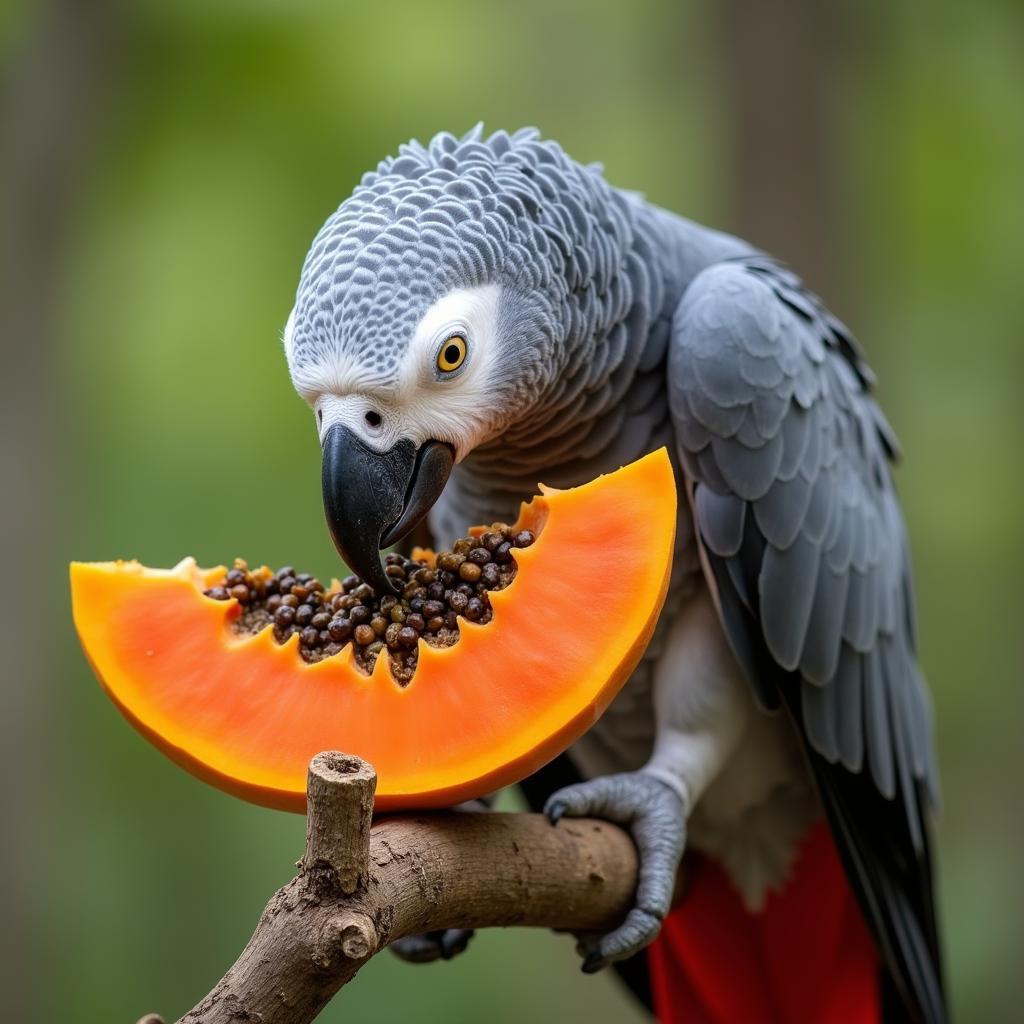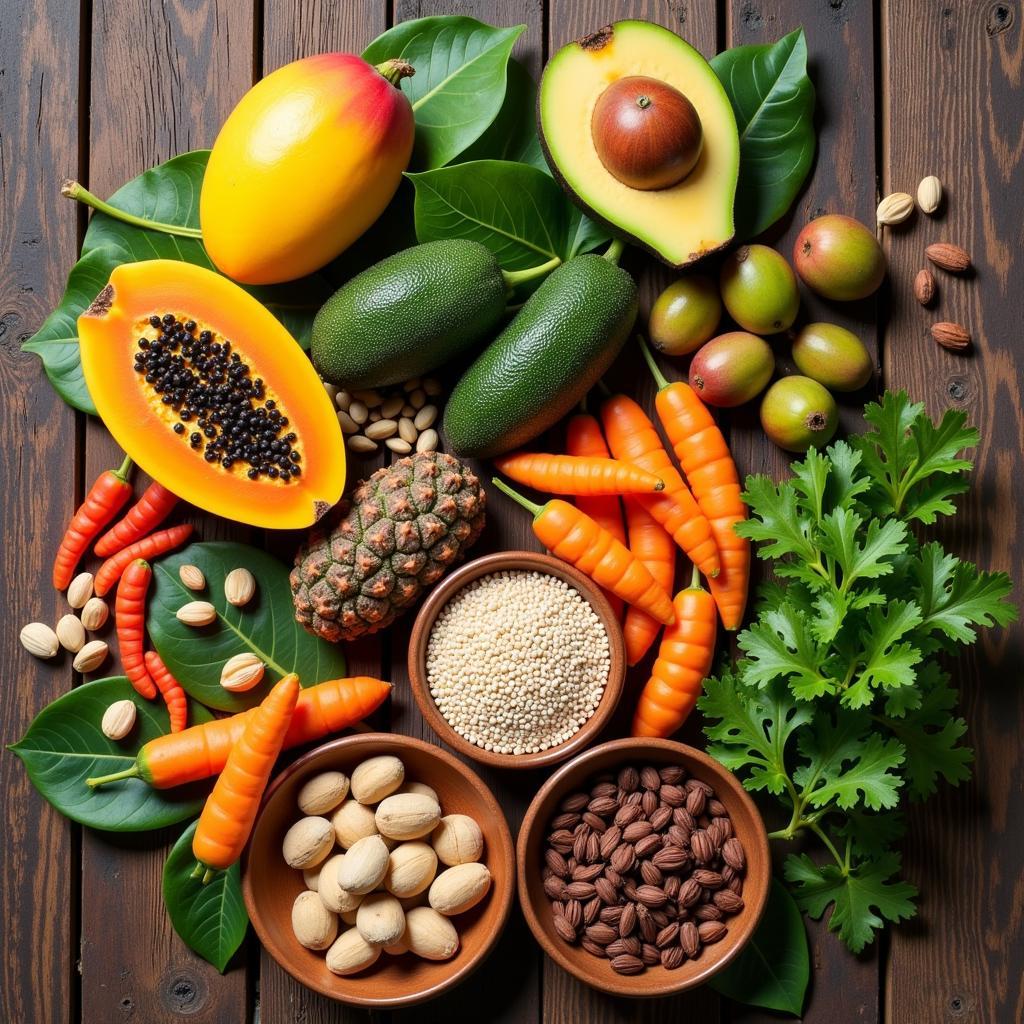African Bird Food: A Guide to What Birds Eat in the Wild & at Home
African Bird Food is as diverse and fascinating as the continent itself. From the grains savored by weavers in the savanna to the nectar enjoyed by sunbirds flitting through tropical forests, the eating habits of African birds offer a captivating glimpse into their world. This guide will explore the captivating world of African bird food, both in their natural habitats and for those kept as pets.
 An African Grey Parrot enjoying a piece of fruit
An African Grey Parrot enjoying a piece of fruit
The Diversity of African Bird Diets
Africa boasts an incredible variety of bird species, each with its unique dietary preferences. Broadly, these can be categorized as follows:
- Granivores: These birds, such as weavers, sparrows, and doves, primarily consume seeds and grains. Their strong beaks are perfectly adapted for cracking open seeds, playing a crucial role in seed dispersal across the continent.
- Frugivores: From the iconic African Green Pigeon to the brightly colored parrots, these birds are fruit lovers. They are essential for forest regeneration, spreading seeds through their droppings.
- Nectarivores: Sunbirds, with their long, slender beaks, and the spectacular mousebirds are nectar specialists. Their feeding habits make them vital pollinators for a variety of flowering plants, including aloes and proteas.
- Insectivores: Bee-eaters, with their dazzling aerial displays, and the ground-dwelling hornbills rely heavily on insects. They play a vital role in controlling insect populations, contributing to the ecological balance.
- Carnivores: Birds of prey, like the majestic African Fish Eagle and the powerful Martial Eagle, dominate the African skies. Their diet consists primarily of fish, rodents, reptiles, and even other birds.
 An African Fish Eagle pulling a fish out of the water
An African Fish Eagle pulling a fish out of the water
The Importance of Diet for African Grey Parrots
African Grey Parrots, known for their intelligence and ability to mimic human speech, are popular pets worldwide. Providing them with a diet that mirrors their natural feeding habits is crucial for their health and well-being.
- Variety is Key: In the wild, African Grey Parrots enjoy a diverse diet of fruits, seeds, nuts, and leafy greens.
- Pellets as a Foundation: High-quality parrot pellets should form the basis of their diet, providing essential nutrients.
- Fresh Fruits and Vegetables: Offer a colorful array of fresh produce, such as apples, bananas, berries, carrots, and leafy greens.
- Healthy Treats: Nuts like almonds and walnuts can be offered in moderation as treats.
Threats to African Bird Habitats and Food Sources
Sadly, many bird species in Africa face threats to their survival due to habitat loss, climate change, and the illegal pet trade. Protecting their natural environments and ensuring the availability of diverse food sources is essential for their conservation.
- Deforestation and Agriculture: The expansion of agriculture and logging activities leads to the loss of crucial foraging grounds.
- Climate Change: Altering weather patterns can disrupt breeding cycles and impact the availability of food and water sources.
- Illegal Wildlife Trade: The capture of wild birds for the pet trade, including African Grey Parrots, depletes populations and disrupts ecosystems.
Supporting Bird Conservation Efforts
We can all play a part in protecting African birds and their habitats. Here are a few ways to get involved:
- Support Ethical Ecotourism: Choose tour operators committed to responsible wildlife viewing and conservation practices.
- Support Conservation Organizations: Many organizations work tirelessly to protect African birds and their habitats. Consider donating or volunteering your time.
- Advocate for Change: Raise awareness about the challenges facing African birds and encourage sustainable practices.
FAQs about African Bird Food
What do African birds eat in the savanna?
Savanna birds have adapted to a diet of seeds, insects, and small reptiles. Weavers, for instance, primarily feed on grass seeds, while bee-eaters catch insects on the wing.
Are there any poisonous plants that African birds avoid?
Yes, like all animals, African birds have evolved to avoid certain toxic plants. For example, the Castor Bean plant, while common in parts of Africa, is poisonous to many bird species.
Do African Grey Parrots need meat in their diet?
While African Grey Parrots primarily eat plant-based foods in the wild, they occasionally consume insects and snails for protein. In captivity, this can be supplemented with small amounts of cooked chicken or boiled eggs.
 A colorful assortment of fruits, vegetables, seeds, and nuts suitable for African birds
A colorful assortment of fruits, vegetables, seeds, and nuts suitable for African birds
Conclusion
Understanding the dietary needs of African birds, both in the wild and in our homes, is crucial for appreciating these incredible creatures. By protecting their habitats and ensuring access to a variety of nutritious foods, we contribute to the survival of these magnificent birds for generations to come.
If you’re considering welcoming an African Grey Parrot into your home, remember to provide a varied diet rich in fruits, vegetables, and high-quality pellets.
[african grey for sale](https://omenkamag.com/african-grey-for sale/)
For those fascinated by the wonders of the African wild, exploring the feeding habits of its avian inhabitants offers a unique lens through which to appreciate the continent’s biodiversity and the interconnectedness of its ecosystems.
If you need any further assistance, please don’t hesitate to contact us:
Phone Number: +255768904061
Email: kaka.mag@gmail.com
Or visit us at: Mbarali DC Mawindi, Kangaga, Tanzania. We have a 24/7 customer service team ready to help.

